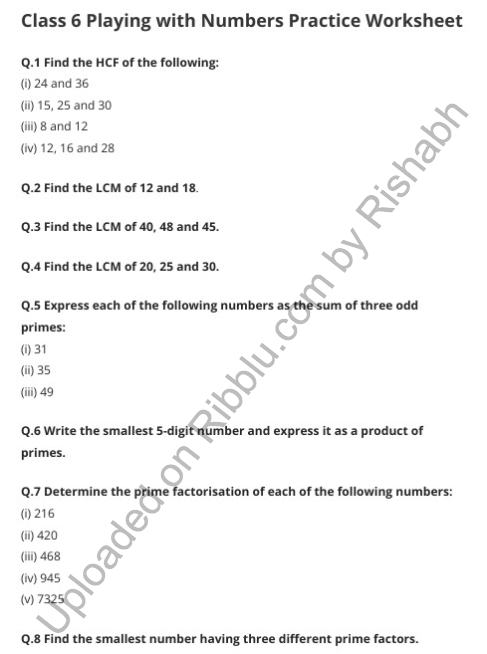Download free pdf of Chapter 3 Playing with Numbers Worksheets for Class 6 Maths. Students can easily get all the Class 6 Maths Worksheets and Exercises in Free Printable ( PDF Format) as per the latest syllabus and examination pattern in CBSE and NCERT pattern. Below you will find all the Knowing Our Numbers related sums that are asked in 6th Grade Mathematics Exams Across Indian Schools.
Playing with Numbers Worksheets for Class 6 in PDF Format
- Class 6 Maths Playing With Numbers Solved Worksheet-11 Chapter 3
- Class 6 Maths Playing With Numbers Solved Worksheet-10 Chapter 3
- Class 6 Maths Playing With Numbers Solved Worksheet-9 Chapter 3
- Class 6 Maths Playing With Numbers Solved Worksheet-8 Chapter 3
- Class 6 Maths Playing With Numbers Solved Worksheet-7 Chapter 3
- Class 6 Maths Playing With Numbers Solved Worksheet-6 Chapter 3
- Class 6 Maths Playing With Numbers Solved Worksheet-5 Chapter 3
- Class 6 Maths Playing With Numbers Solved Worksheet-4 Chapter 3
- Class 6 Maths Playing With Numbers Solved Worksheet-3 Chapter 3
- Class 6 Maths Playing With Numbers Solved Worksheet-2 Chapter 3
- Class 6 Maths Playing With Numbers Solved Worksheet-1 Chapter 3
- CBSE Class 6 Maths Worksheet Playing with Numbers – 5
- CBSE Class 6 Maths Worksheet Playing with Numbers – 4
- CBSE Class 6 Maths Worksheet Playing with Numbers – 3
- CBSE Class 6 Maths Worksheet Playing with Numbers – 2
- CBSE Class 6 Maths Worksheet Playing with Numbers – 1
- Playing with Numbers Class 6 Worksheet
- Class 6 Maths Worksheet – Playing With Numbers
- Class 6 Maths MCQ Worksheet 4 – Playing With Numbers
- Class 6 Maths MCQ Worksheet 3 – Playing With Numbers
- Class 6 Maths MCQ Worksheet 2 – Playing With Numbers
- Class 6 Maths MCQ Worksheet 1 – Playing With Numbers
- Playing with Numbers CBSE Class 6 Maths Worksheet
- Playing with Numbers CBSE Class 6 Maths Worksheet in PDF
- Maths Worksheets for CBSE Class 6 Playing with Numbers
Class 6 Playing with Numbers Practice Worksheet
Q.1 Find the HCF of the following:
(i) 24 and 36
(ii) 15, 25 and 30
(iii) 8 and 12
(iv) 12, 16 and 28
Q.2 Find the LCM of 12 and 18.
Q.3 Find the LCM of 40, 48 and 45.
Q.4 Find the LCM of 20, 25 and 30.
Q.5 Express each of the following numbers as the sum of three odd primes:
(i) 31
(ii) 35
(iii) 49
Q.6 Write the smallest 5-digit number and express it as a product of primes.
Q.7 Determine the prime factorisation of each of the following numbers:
(i) 216
(ii) 420
(iii) 468
(iv) 945
(v) 7325
Q.8 Find the smallest number having three different prime factors.
Q.9 Find the smallest number having four different prime factors.
Q.10 Test the divisibility of the following number by 2:
(i) 6520
(ii) 1245
(iii) 1268
Q.11 Test the divisibility of the following number by 3:
(i) 70335
(ii) 607439
(iii) 9082976
Q.12 Write all the factors of the following numbers :
(a) 24 (b) 15 (c) 21 (d) 27 (e) 12 (f) 20(g) 18 (h) 23 (i) 36
Q.13 Write first five multiples of :
(a) 5 (b) 8 (c) 9
Q.14 Find all the multiples of 9 upto 100.
Q.15 Write all the prime numbers less than 15.
Q.16 The numbers 13 and 31 are prime numbers. Both these numbers have same digits 1 and 3. Find such pairs of prime numbers upto 100.
Q.17 Express the following as the sum of two odd primes.
(a) 44 (b) 36 (c) 24 (d) 18
Q.18 Express each of the following numbers as the sum of three odd primes:
(a) 21 (b) 31 (c) 53 (d) 61
Q.19 Write five pairs of prime numbers less than 20 whose sum is divisible by 5.
Q.20 Give three pairs of prime numbers whose difference is 2.
Q.21 Using divisibility tests, determine which of the following numbers are divisible by 4; by 8:
(a) 572 (b) 726352 (c) 5500 (d) 6000 (e) 12159
(f) 14560 (g) 21084 (h) 31795072 (i) 1700 (j) 2150
Q.22 Using divisibility tests, determine which of following numbers are divisible by 6:
(a) 297144 (b) 1258 (c) 4335 (d) 61233 (e) 901352
(f) 438750 (g) 1790184 (h) 12583 (i) 639210 (j) 17852
Q.23 Find the least number which when divided by 12, 16, 24 and 36 leaves a remainder 7 in each case.
Q.24 The length, breadth and height of a room are 825 cm, 675 cm and 450 cm respectively. Find the longest tape which can measure the three dimensions of the room exactly.
Q.25 Determine the smallest 3-digit number which is exactly divisible by 6, 8 and 12.
Q.26 Determine the greatest 3-digit number exactly divisible by 8, 10 and 12.
Q.27 The traffic lights at three different road crossings change after every 48 seconds, 72 seconds and 108 seconds respectively. If they change simultaneously at 7 a.m., at what time will they change simultaneously again?
Q.28 Three tankers contain 403 litres, 434 litres and 465 litres of diesel respectively. Find the maximum capacity of a container that can measure the diesel of the three containers exact number of times.
Q.29 Find the least number which when divided by 6, 15 and 18 leave remainder 5 in each case.
Q.30 Find the smallest 4-digit number which is divisible by 18, 24 and 32.
Q.31 Renu purchases two bags of fertiliser of weights 75 kg and 69 kg. Find the maximum value of weight which can measure the weight of the fertiliser exact number of times.
